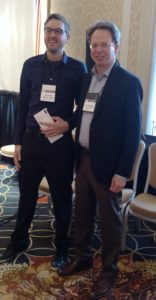
Michael Gibson-Light, Ph.D. Candidate in Sociology, University of Arizona
mgibson@email.arizona.edu
https://www.gibson-light.com/
Title: Ramen Politics: Informal Money and Logics of Resistance in the Contemporary American Prison
ABSTRACT:
After relying on cigarettes as the de facto token of exchange in underground prison economies for generations, the nation’s inmates have adopted a new form of informal money: ramen noodles. Drawing on 18 months of ethnographic fieldwork within a U.S. men’s state prison and 82 in-depth interviews with inmates and prison staff, this paper explores this change in the form of informal prison money and what it reveals about the contemporary American prison and its inmates. It contends that, beyond operating as a mere substitute for formal state currency, which the incarcerated cannot directly access, prison money reflects changing logics of prisoner resistance in particular political-economic and penal contexts. As prison administrative practices, institutional conditions, and legal environments change with time, inmates adapt expressions of autonomy accordingly. While cigarettes symbolized withdrawal from the rigors of prison life and individualized treatment—the dominant logic of resistance of the era—the new ramen currency reflects a growing emphasis on prison “foodways” in opposition to cost-shifting and deteriorating services behind bars.
Bio: Michael is a scholar of punishment and incarceration, work, economic practice, and culture, specializing in the study of penal labor. His dissertation, titled “Capital or Punishment: How Prison Labor Systems Reproduce Inequality,” entails an 18-month ethnography within one U.S. men’s state prison and 82 in-depth interviews with prisoners and prison staff. It investigates the structure and practice of inmate labor, revealing a stratified prison employment system that reflects and reproduces disparities along the lines of race, ethnicity, nationality, and class. Social barriers are here reproduced not between the poor and rich or the incarcerated and free, but within the narrower range of social class occupied by the prisoner population. Michael’s work has been published in Research in the Sociology of Work, Poetics and Cinta de Moebio, and has been reported in The Guardian, Washington Post, BBC, NPR, Atlantic, USA Today, Time, and over 100 other outlets.